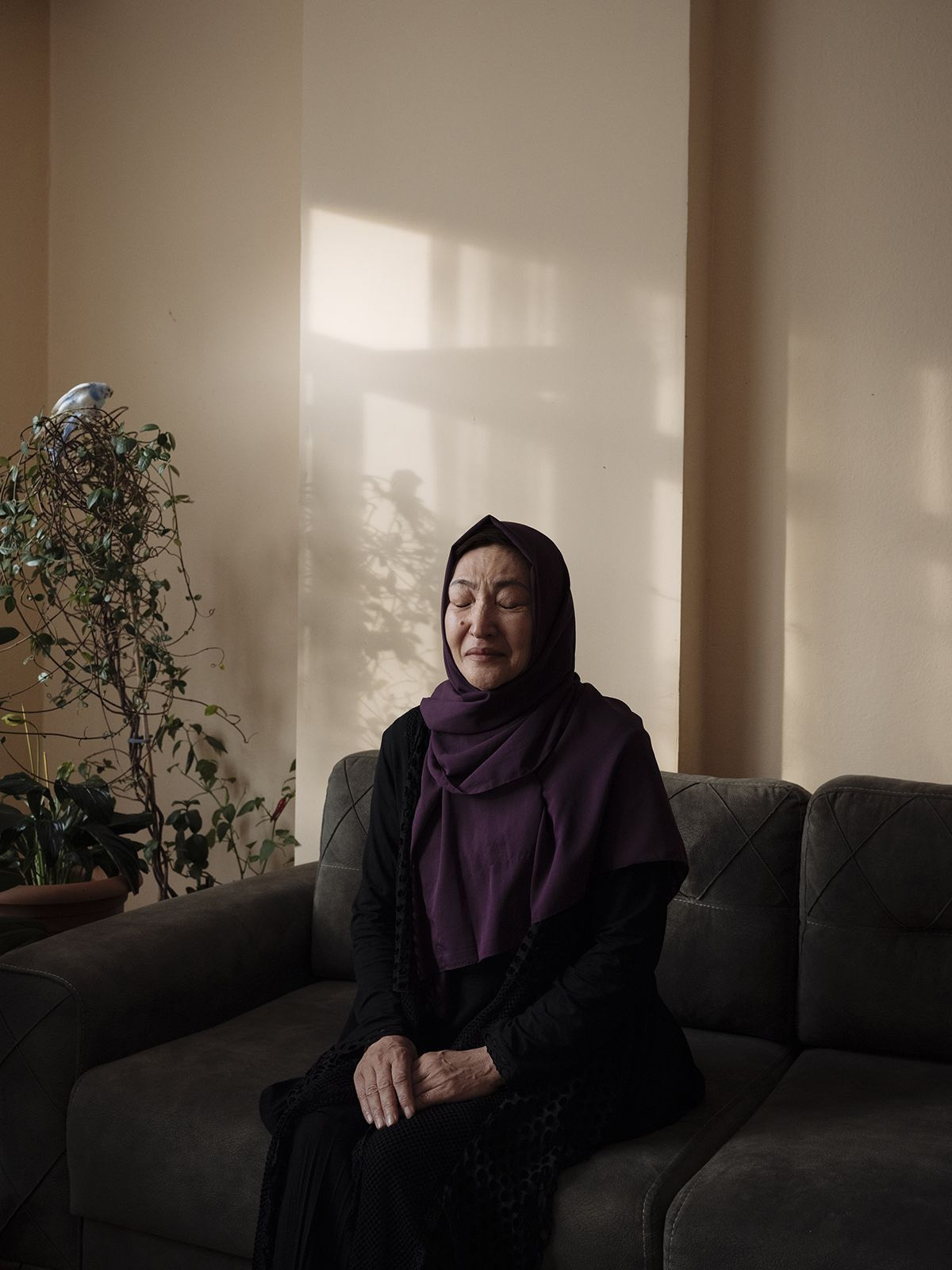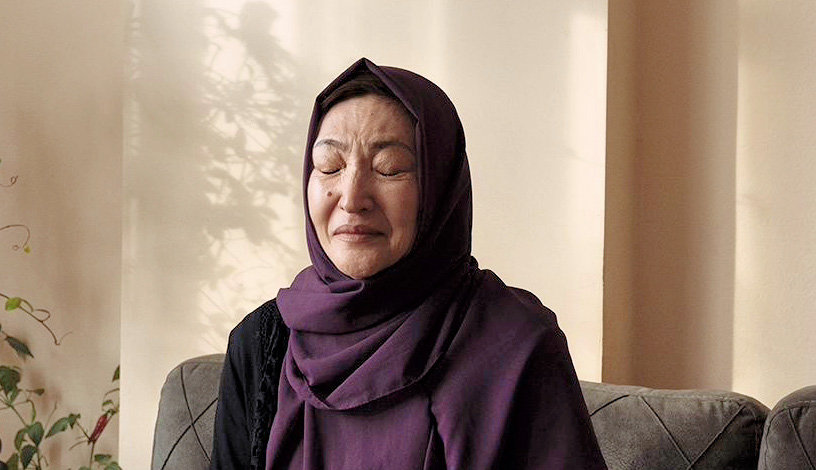
In China’s Xinjiang province, one million Uighurs, Turkic speakers and Muslims, are imprisoned in concentration camps to be « re-educated ». A former Kazakh prisoner of Uighur origin testifies to the horror.
In a Spartan apartment on the outskirts of Istanbul, Gulbahar Jelilova speaks for the first time to a foreign media. Despite her fear of retaliation, she describes her long and traumatic detention in Chinese concentration camps, a story full of wild and revolting details: constantly shackled feet, the metal chair on which the inmates are tied 24 hours in a row on interrogation days, humiliating searches in the intimate parts of the body, the mindlessness due to brainwashing techniques or injections of unknown substances, dirt, promiscuity, confinement, lack of air, sun, water, food…
They formally forbade me to talk about what I had seen and experienced
A Kazakh citizen of Uighur origin (her family has been living in Almaty for three generations), this energetic 54-year-old businesswoman had been running a successful import-export company for 20 years. But one day in May 2017, she was thrown, like a million other ordinary Uighurs, into a maelstrom of unfathomable suffering imagined by China to bring Muslim minorities perceived as recalcitrant into line. Gulbahar was eventually released one year, three months and ten days later, as arbitrarily as she had been arrested. To date, only a few foreign nationals have been able to leave the barbed-wire-covered walls of these gulags of a new kind.
As a refugee in Turkey, she still feels at the mercy of her tormentors. “They formally forbade me to talk about what I had seen and experienced,” she said trembling. She’s afraid to go out, to be murdered in the street by Chinese agents. But the need to tell is too strong, and especially the need to keep her promise to her companions of misfortune. “You, Gulbahar, you’re lucky,” they said, “you’re a Kazakh national, they’ll eventually release you. Don’t forget us when you’re outside.”
Arrested to be “re-educated” by force
How could she forget? She’s obsessed with the hell of the camps. Each question triggers an avalanche of words spoken in a mixture of horror and disbelief, as if she was still struggling to understand and afraid that she would not have enough time to say everything. Until that fateful day in May 2017, Gulbahar had only known the attractive face of China. Her business trips had taken her to the glittering coastal megacities where she would buy clothing for selling in the Kazakh capital. She shows pictures of herself “before”: lush hair, flashy clothes, sitting in her company’s wood-lined office in Urumqi, capital of Xinjiang, the Chinese province where her family originates.
“Like all Kazakhs doing business with China, I had a trading partner in Xinjiang. In the spring of 2017, my partner called me to Urumqi to discuss our business.” To her misfortune, Gulbahar ignores that a great wave of arbitrary internments has begun to fall on the Turkic-speaking province. She doesn’t know that her partner was caught in one of the early roundups, all her contacts trapped one by one. As soon as she arrives in Urumqi, she is taken to the police station, accused by menacing cops to be the accomplice of terrorists, of having transferred 17,000 yuan (about 2,200 euros) to a Turkish company.
Gulbahar has never heard of this company or this transaction. The police finds no evidence in her papers. It doesn’t matter: she is now part of the cohort of “suspect” Uighurs that Beijing has decided to put in jail to forcibly “re-educate” them. She was handcuffed, a black hood was put on her head, and she was taken to “Sankan”, a former Urumqi men’s prison converted into a “re-education” camp for women.
Chained around the clock
According to estimates by researchers who cross-reference information from various sources — from satellite images to analysis of public tenders or stolen videos — at least one million people are trapped in these severely guarded prisons. Detainees are subjected to deprivation, ill treatment and torture combined with extremely brutal mental manipulation. The Chinese Communist Party is famous for its formidable brainwashing techniques — a term borrowed from the Chinese word “xinao” — developed on enemies both inside and out.
Gulbahar is thrown into a universe that has all the makings of a waking nightmare. The guards give her a T-shirt, pants and an orange vest — the colour that means “awaiting trial” — the only clothes she will have for the duration of her incarceration. They put at her feet heavy shackles that will never be removed, even to wash or sleep.
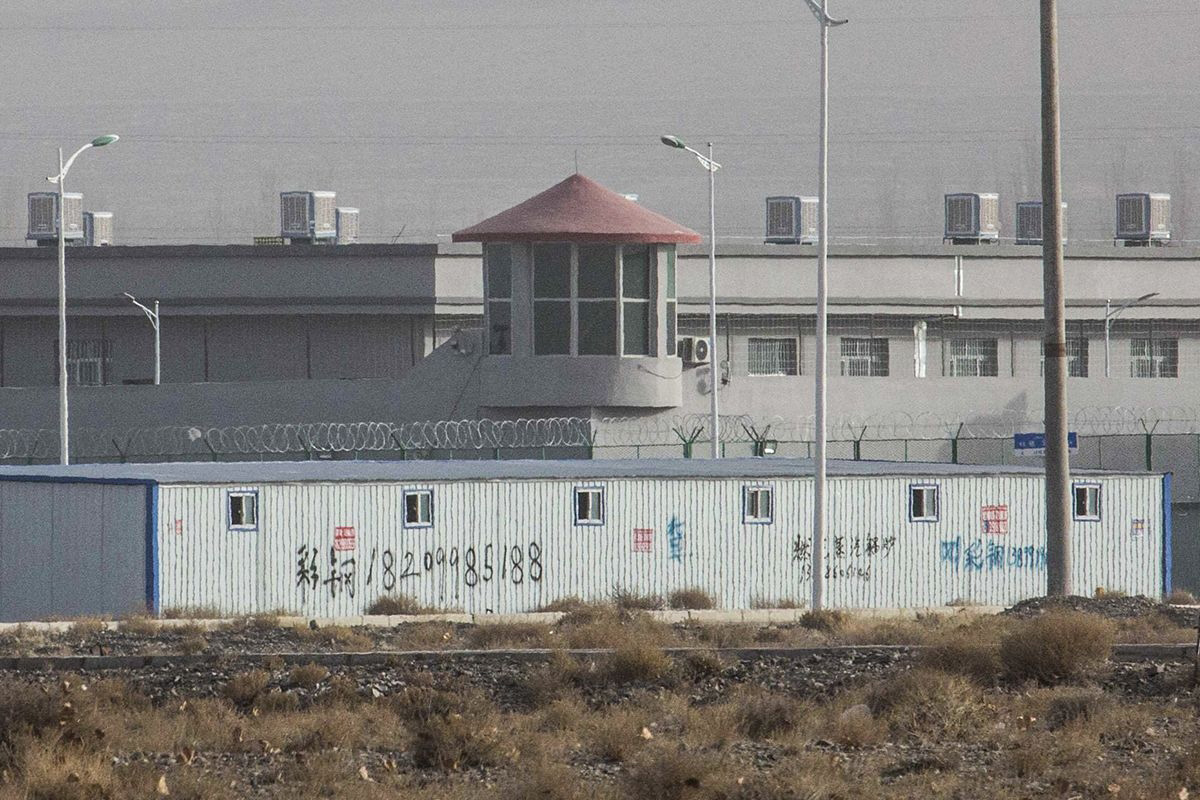
One of the internment camps in Xinjiang: Kunshan in Artux
She is taken to a long, narrow cell, 7 metres by 3 metres, packed to capacity. In a fetid and suffocating atmosphere, about thirty women crowded together. They all have shaved heads. As the raids progressed, they will be up to sixty to share a barely enough space for ten. They are mostly Uighur women, a few ethnic Kazakh or Uzbek, no Chinese of the Han majority. “They had worn and punctured socks at their feet, and all had toes in the air. They had cut them themselves by rubbing them on the toilet pane, to make a strip that they would wear at the ankles to try to protect somehow the skin wounded by the constant rubbing of the heavy foot chains…”
Up to sixty to share a 20 square meters cell
The overcrowding is such that, at night, the prisoners take turns sleeping in two-hour shifts: while half have to stand up, the others can lie down, tight as sardines, on a kind of concrete platform that occupies three quarters of the room… In winter, they have only four blankets for the entire cell to protect them from the bitter cold. The neon lights are on day and night. There is no window, no natural light, and no ventilation. The only opening is a small trapdoor in the metal door through which the guards pass the food —so brutally that much of it falls to the ground.
You never leave the cell, except to be punished: taken to the interrogation room, or to the dungeon
It is in these 20 square metres that the women spend their entire day, under the watchful eye of cameras placed at the four corners of the room. “You never leave the cell, except to be punished: taken to the interrogation room, or to the dungeon.” The washing, the use of the toilet are done in full view of everyone, in a tiny shower cum toilet area that occupies one side of the cell behind a transparent glass. In the morning, they have one minute to wash their faces. Once a week, a two-minute cold shower, which must be taken by two people in the cabin with transparent walls, rushing not to exceed the 40-minute time limit for all inmates to shower.
Because of the impossibility of cleaning ourselves, we had terrible skin diseases
Only one soap is distributed per cell, which the women must cut with a comb into 30 tiny fragments. “It was barely enough to wash our faces and hands… Same thing for our clothes: we had to wash them twice a month, almost without soap, and wear them without waiting for them to dry, having no change of clothes.” Unveiling the swollen plaques that devour the skin of her arms and stomach, Gulbahar confides: “Because of the impossibility of cleaning ourselves, we had terrible skin diseases. I’ve been out for three months and can treat my wounds, but my itching still keeps me awake.”
Apart from twenty minutes of “exercise” a day — which consists of standing up and shaking your limbs, without moving too much because of lack of space — most of the day is devoted to “reeducation”: the women must remain seated on the floor, crossed legs, hands on their knees, aligned in rows of 15, in three rows, listening to loudspeakers that constantly spit out propaganda. “You have to stay totally still, looking at the wall while listening to the radio. If you try to whisper a word to the woman next to you, if you turn your head a little, the guards who watch you through the cameras yell insults at you in the loudspeaker. If you do it again, it’s punishment.”
They wanted us to disown our culture, our traditions, our religion; to recognize the superiority of China, its civilization, its development
In the purest tradition of Maoist indoctrination, thought to have been over since the end of the Cultural Revolution forty years ago, women prisoners receive paper and a pencil once a week. Each of them then has to think about how to write her weekly “self-criticism”. Gulbahar, who has never learned Chinese, must beg the help of the “cell chief” to write down her “thought crimes”:
“We had to express our gratitude to the Communist Party for being so generous, for feeding and educating us. We had to confess our mistakes and our betrayal of such a benevolent party, to say that we understood our mistake and swear to be faithful Chinese citizens in the future. They wanted us to disown our culture, our traditions, our religion; to recognize the superiority of China, its civilization, its development.”
I repeated what they said in these videos: the Communist Party is wonderful, it has led China to wealth and power
Gulbahar draws on videos praising China’s glory that the women must watch every week on a television screen fixed high on a wall: “I repeated what they said in these videos: the Communist Party is wonderful, it has led China to wealth and power. Thanks to the Party, China is number one everywhere: we have the biggest planes, the biggest ships, the biggest rockets, etc. There is no better place in the world than China…”
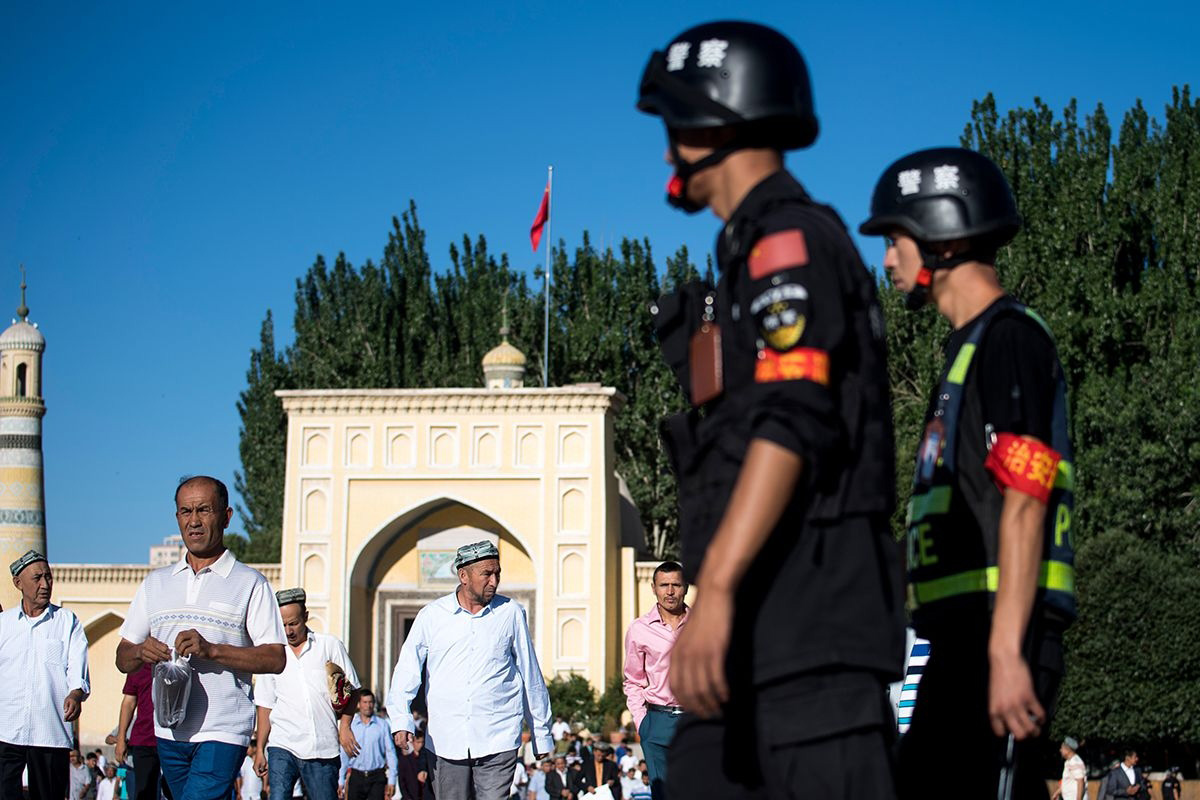
Police patrol outside a mosque in Kashgar (2017)
Punishments fall for a yes or no. The slightest retaliation is the reduction of the notoriously insufficient food ration to a piece of bread and a glass of tea per meal, for a week or a month. The ordinary meal consists of a stale roll accompanied by a clear soup in which a tiny piece of cucumber is floating, with no salt and without a drop of oil. Is it malnutrition, or the effect of periodic injections or pills to swallow daily? Women see their periods disappear and spend their days in a mental fog that plunges them into apathy.
The punishment can be more severe when a prisoner expresses herself in Uighur: the guards then tightly attach her wrists to the chains of her feet, forcing her to remain twisted in a painful position. The only language allowed is Chinese, even for illiterate older women who only know their dialect, or for foreign nationals like Gulbahar. The latter ended up learning quickly the handful of required expressions (“present”, “thank you”, “at your command”) as well as the lyrics of the hymns to the glory of the Chinese Communist Party and Mao that the prisoners had to sing daily.
The terrifying “tiger chairs”
Periodically, the detainees are taken away for intense interrogation. They are expected to confess to a variety of crimes, all of which amount to opposition to the Party. The women, attached to the terrifying “tiger chairs”, are then subjected to torture, beatings, and electrocution… Gulbahar herself had to undergo these terrifying sessions every three months.
We can keep you here for the rest of your life. Confess, confess!
She describes how her wrists and ankles were tied to the chair by metal circles so tight that they were encrusted in the flesh. How the interrogators took turns every two hours, screaming, banging their fists, demanding that she confess to collaborating with terrorists, to having made this 17,000 yuan transfer to Turkey… Or questioning her about all aspects of her life, her business, her children: are they devout Muslims, do they praying? Or on her friends: do they go to the mosque?
“I told them: ‘But I am Kazakh, I live in a Muslim country where people often go to the mosque…’ They would go angry and threaten me, ‘We can keep you here for the rest of your life. Confess, confess!’”
They came out covered in blood, trembling with all their limbs, terribly quiet…
As horrific as these experiences were, there was worse: Uighur women who had gone to a Muslim country — to study, work or simply to visit — were subjected to much more serious torture: “They came out covered in blood, trembling with all their limbs, terribly quiet… Some of them would not come back at all. Others died shortly after being sent back to the cell.”
All those who were subjected to the “black hole” came out of it changed
The maximum punishment, the one that makes all women shake, is the dungeon, a cubbyhole of less than two square metres plunged into total darkness. “All those who were subjected to the “black hole” came out of it changed. They had gone mad at the thought that their water, food and body were at the mercy of the rodents they heard running in the dark,” says Gulbahar with horror.
“I cried thinking of my sisters who were left behind.”
News of these camps having leaked, the Beijing authorities are facing a global outcry. They claim that these camps provide Uighurs with training in trades, Chinese language, etc. Gulbahar vehemently contests: “Most of these women belong to the elite, they are lawyers, doctors, professors, artists, etc., and speak Chinese better than the guards! There are also traders, employees of municipalities, women who have a trade or business.”
Gulbahar remembers in particular the very young high school girls, sometimes as young as 14 years old, who were plunged into perpetual horror; desperate post partum women from which their babies had been taken forcibly and who had to express their breast milk by hand; mothers mad with worry about the fate of their young children left to their own devices; the elderly women, sick, suffering from rheumatism…
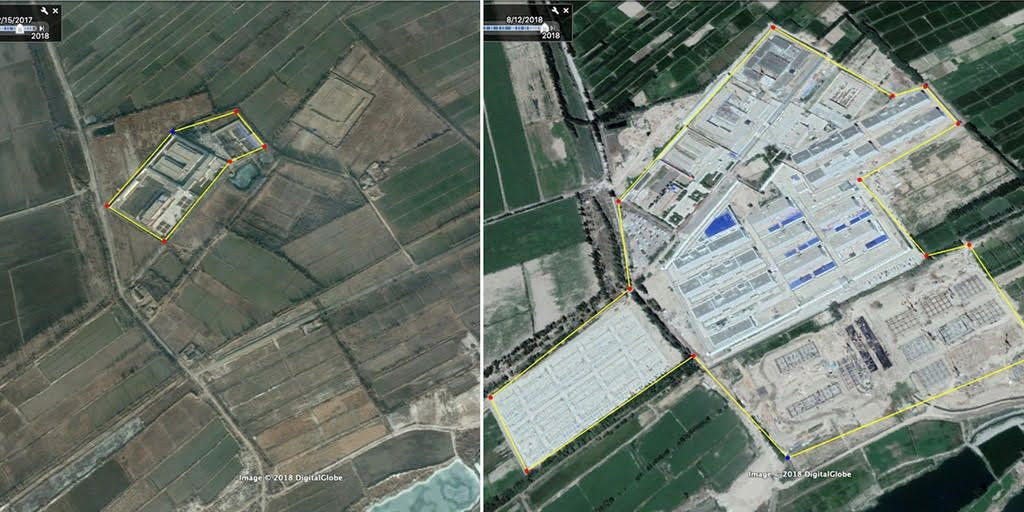
Satellite images of the expansion of one of the Kashgar camps. In February 2017 (left), in August 2018 (right)
For Gulbahar, the guards had a unique obsession: to prohibit any expression of Uighur or Muslim identity. Constant surveillance to prevent anything that might resemble the gestures of prayer; reduced access to water to avoid ritual ablutions; repeated searches forcing inmates to undress in public so that guards can check that they have not hidden holy texts in their genitals…
“They are afraid of the slightest thought, the slightest gesture that is beyond the Party’s control. They want to turn us into soulless zombies, without belief, without pride, who just know how to scream: ‘Long live the Chinese Communist Party! Thanks to Xi Jinping for his kindness! I’m Chinese, I’m proud to be Chinese!’”
They are afraid of the slightest thought, the slightest gesture that is beyond the Party’s control
What Gulbahar did not know at the time was that her three children had repeatedly urged the Kazakh authorities to release her, and that a discreet intervention by the Kazakh Embassy in Beijing led her to be eventually be released. One day in August 2018, armed guards dragged him out of the cell, feet and wrists loaded with chains, a black hood on her head. She believes that her last hour has come, that they will stick her against a wall and shoot her. But she was taken to a medical detention centre. She was told that in the absence of evidence of association with terrorists, she would be released. Though not immediately, because she is too weak and frighteningly skinny.
For two weeks, she was fed, injected with fortifiers. They dyed her hair, which had turned completely white. Then they give her back her passport and took her to the airport. Gulbahar recalls: “My interrogator came. He said to me, ‘Why aren’t you happy?’ I said, ‘Why would I be happy?’ He said, ‘You’re acquitted.’ And I cried, cried, cried, thinking of all my sisters who remained behind these walls with barbed wire..”
